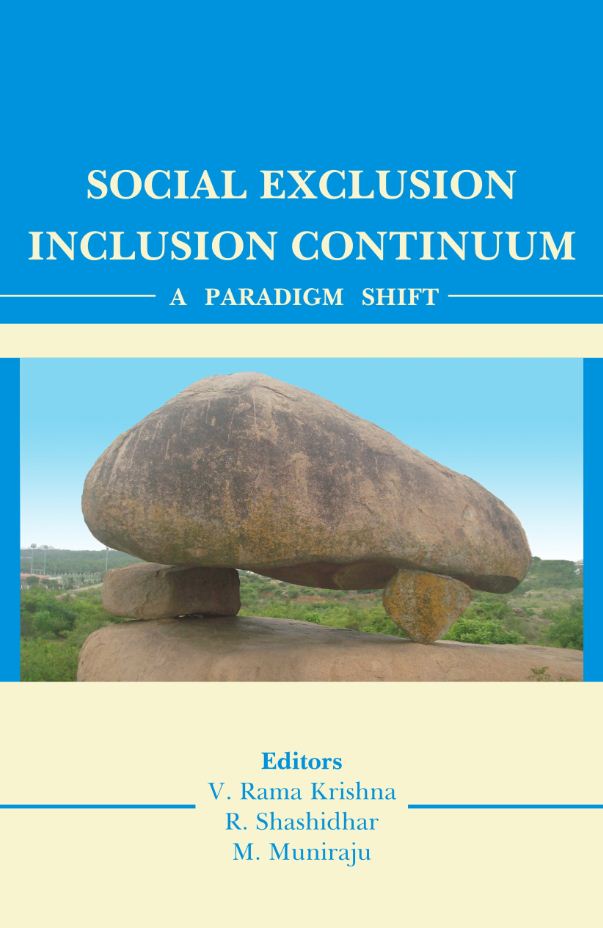- Social Work Books
- >
- Social Exclusion Inclusion Continuum
Social Exclusion Inclusion Continuum
SKU:
$0.00
Unavailable
per item
Contents
Preface
About The Book
Contributors Details
About The Editors
1. What Does it Mean to be an Untouchable? A Study of the Many Contours of Subjugation and “Independence” In Mulk Raj Anand’s Untouchable
Amarjeet Nayak
2. Sustainable Development of Businesses Key to Social Inclusion
Kimi Thareja & Rashi Thareja
3. Inclusive Growth and Socio-Economic Political linkage of Inclusive Policies for Exclusive Sections
V. Rama Krishna
4. General Health and Alienation Status of Divorced Women in Bangladesh
Neaz Ahmed Ph.D & Abul Hossen Ph.D
5. A Review of Higher Education and ICT Analysis in India: An Inclusive Approach for Social Change
R. Shashidhar & Muniraju M
6. Dalit Education and the ideology of Ambedkar: A case study in Odisha
Madhusmita Sahoo & Swagatika Biswal
7. Improving Child immunization in EAGA states: Learning from Kerala experience
Rajesh J Nair
8. Campaigning for Inclusion: Muslims and Social Exclusion in Contemporary West Bengal
Kenneth Bo Nielsen
9. Social Capital and Financial Inclusion through Banking Technology Education as A Silver Lining to Quell Social Exclusion
Krishna Kishore & Dr. Aloysius Sequeira
10. Social exclusion of Criminal Tribe: A Case Study on Lodhas of West Bengal
Proggya Ghatak
11. Philosophy of Social Inclusion in Indian Tradition
Professor Raghunath Ghosh
12. Rammanohar Lohia and Vivekananda’s Idea of Social Exclusion: A Comparative Analogy
Pratyay Dutta
13. Safe Motherhood Practices: A study among the Indian Tribal Mothers
Dr. A. K. Ravishankar
14. Awareness of Pubertal Changes of Schedule Tribe Adolescents: A Comprehensive Programme in Rajasthan
Parul Tripathi
15. Studying socio-economic factors affecting Female Foeticide in Himachal Pradesh
Shashi Punam & Piar Chand Ryhal
16. Gender Mainstreaming: A Concrete Way for Social Inclusion
Rangaswamy D
17. Changing Faces of Rural Livelihoods in India
Dr. Ramesh B
18. Potential of MGNREGS to Address the Agrarian Crisis: A Case for Repositioning the Scheme
Dr Ashok Antony D’Souza
Social exclusion not only generates tension, violence and dis- ruption but also perpetuates inequality and deprivation in So- ciety. In India, certain communities such as Scheduled Castes, Scheduled Tribes and religious minorities experience systemic exclusion in the matter of taking advantages of development. So- cial exclusion is a complex and multidimensional concept having social, cultural, political and economic ramifications. The conse- quences of macroeconomic policies such as poverty, unemploy- ment and involuntary migration exclude the victims from economic, cultural, and political activities.
Only participatory democracy would provide the foundation for development with dignity. The reciprocity of duty and the right for every citizen to participate and derive benefit from the process of development will alone contribute to Dalits and STs Empowerment.
There is an obvious inequality across regions in terms of socio- economic and political development of SCs, STs, Minorities and Gender. This book is an eye openr and attracts those interested in exclusion and inclusion development in wake of development process and good governance in their various facets and for fur- ther research and development.
Preface
About The Book
Contributors Details
About The Editors
1. What Does it Mean to be an Untouchable? A Study of the Many Contours of Subjugation and “Independence” In Mulk Raj Anand’s Untouchable
Amarjeet Nayak
2. Sustainable Development of Businesses Key to Social Inclusion
Kimi Thareja & Rashi Thareja
3. Inclusive Growth and Socio-Economic Political linkage of Inclusive Policies for Exclusive Sections
V. Rama Krishna
4. General Health and Alienation Status of Divorced Women in Bangladesh
Neaz Ahmed Ph.D & Abul Hossen Ph.D
5. A Review of Higher Education and ICT Analysis in India: An Inclusive Approach for Social Change
R. Shashidhar & Muniraju M
6. Dalit Education and the ideology of Ambedkar: A case study in Odisha
Madhusmita Sahoo & Swagatika Biswal
7. Improving Child immunization in EAGA states: Learning from Kerala experience
Rajesh J Nair
8. Campaigning for Inclusion: Muslims and Social Exclusion in Contemporary West Bengal
Kenneth Bo Nielsen
9. Social Capital and Financial Inclusion through Banking Technology Education as A Silver Lining to Quell Social Exclusion
Krishna Kishore & Dr. Aloysius Sequeira
10. Social exclusion of Criminal Tribe: A Case Study on Lodhas of West Bengal
Proggya Ghatak
11. Philosophy of Social Inclusion in Indian Tradition
Professor Raghunath Ghosh
12. Rammanohar Lohia and Vivekananda’s Idea of Social Exclusion: A Comparative Analogy
Pratyay Dutta
13. Safe Motherhood Practices: A study among the Indian Tribal Mothers
Dr. A. K. Ravishankar
14. Awareness of Pubertal Changes of Schedule Tribe Adolescents: A Comprehensive Programme in Rajasthan
Parul Tripathi
15. Studying socio-economic factors affecting Female Foeticide in Himachal Pradesh
Shashi Punam & Piar Chand Ryhal
16. Gender Mainstreaming: A Concrete Way for Social Inclusion
Rangaswamy D
17. Changing Faces of Rural Livelihoods in India
Dr. Ramesh B
18. Potential of MGNREGS to Address the Agrarian Crisis: A Case for Repositioning the Scheme
Dr Ashok Antony D’Souza
Social exclusion not only generates tension, violence and dis- ruption but also perpetuates inequality and deprivation in So- ciety. In India, certain communities such as Scheduled Castes, Scheduled Tribes and religious minorities experience systemic exclusion in the matter of taking advantages of development. So- cial exclusion is a complex and multidimensional concept having social, cultural, political and economic ramifications. The conse- quences of macroeconomic policies such as poverty, unemploy- ment and involuntary migration exclude the victims from economic, cultural, and political activities.
Only participatory democracy would provide the foundation for development with dignity. The reciprocity of duty and the right for every citizen to participate and derive benefit from the process of development will alone contribute to Dalits and STs Empowerment.
There is an obvious inequality across regions in terms of socio- economic and political development of SCs, STs, Minorities and Gender. This book is an eye openr and attracts those interested in exclusion and inclusion development in wake of development process and good governance in their various facets and for fur- ther research and development.







